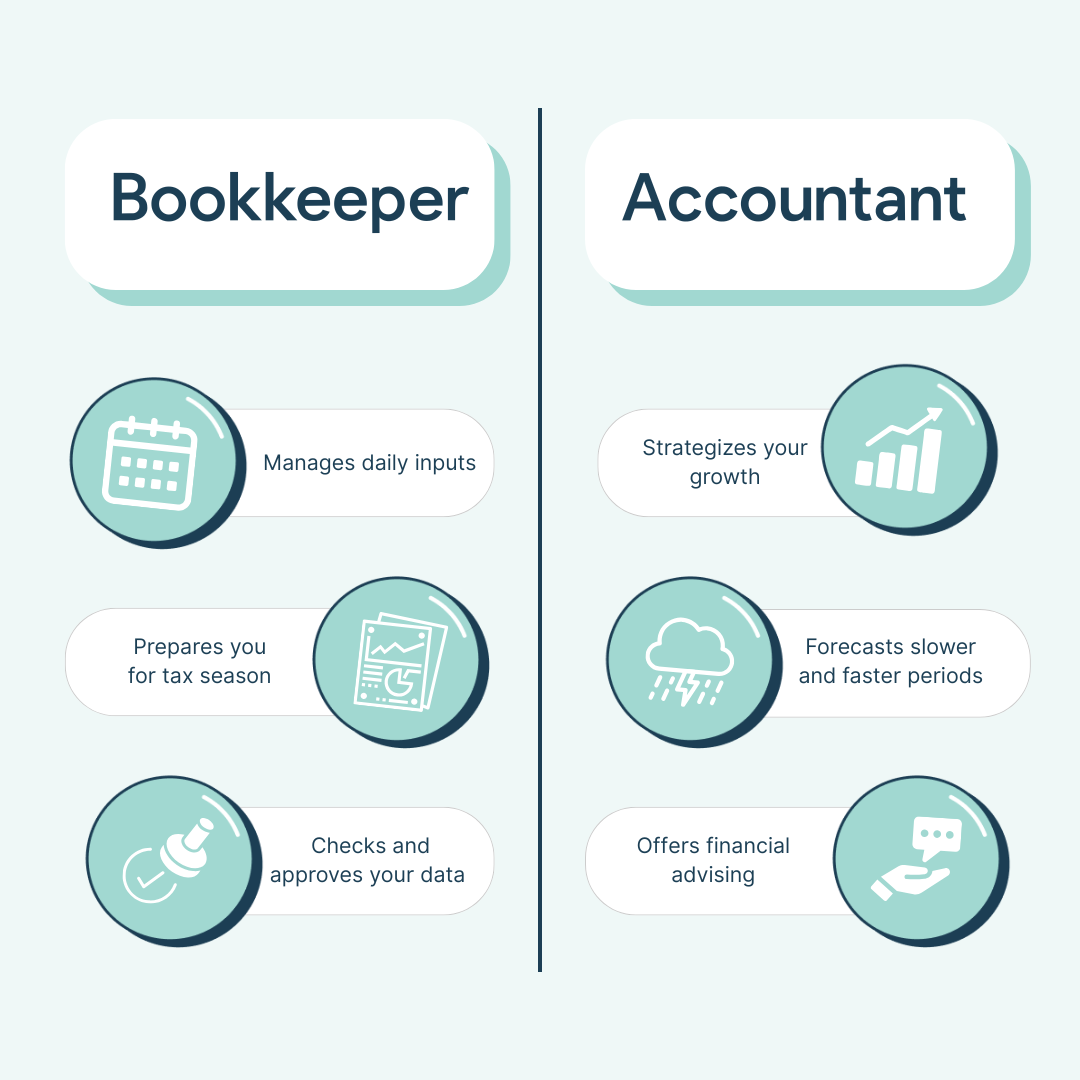MSP Accounting
Does Your MSP Really Need a Bookkeeper?

Most MSP owners start off running their own books or have a close relative or family friend step in. QuickBooks, spreadsheets, and late nights reconciling payments can be manageable in the beginning. But as your operational tasks grow and contracts become more complex, those DIY systems will inevitably start to break down.
That’s where professional financial help comes in. But the question is less about who you hire (bookkeeper vs. accountant) and more so when you hire them. If you wait too long, the cost will show up as misapplied payments, unreconciled accounts, compliance headaches, and missed growth opportunities.
This article will help you decide whether it’s time to seek outsourced help, what role makes the most sense for your MSP, and how to avoid the costly mistakes that come from waiting too long.
Why Generic Bookkeeping Falls Short for MSPs
MSPs have unique challenges that set them apart from most industries. You have to worry about your PSA, recurring billing, vendor costs, prepaid support hours, and far more.
Because of these unique challenges facing MSPs, you need an equally unique financial professional.
A generic bookkeeper could misclassify income categories or struggle with the PSA + QuickBooks integration. It requires genuine familiarity with the industry and the kinds of clients and payment variables to succeed.
But even more than that, it’s natural for bookkeepers or accountants familiar with another industry to go on auto-pilot, funneling their expertise from another field into your data, making it inaccurate for an MSP. And with the highly repetitive tasks that come with recurring billing models, there is a higher likelihood of significant human error.
The result is bad data that accountants (and auditors) can’t trust.
How MSPs Benefit from a Bookkeeper vs. an Accountant
As your MSP grows, it’s critical you have someone in a full-time financial role. But at that point, the question will be “which kind of support do I need right now?” The answer depends on how mature your business is, and what kind of support will unlock the most value.
Bookkeepers: Building the Foundation
A bookkeeper is a trusted financial partner. They handle the details that can quickly overwhelm an MSP owner. For example:
- Recording daily transactions: Ensuring every expense, payment, and deposit is logged accurately.
- Reconciling deposits: Matching bank deposits to invoices so nothing slips through the cracks. For businesses with recurring billing (like MSPs), this prevents revenue leakage and ensures your AR aging reports are trustworthy.
- Processing payroll: Handling salaries, overtime, and contractor payments while staying compliant with tax withholdings. (This is a huge time saver for the MSP owner who is currently processing payroll on their own.)
- Tracking accounts payable and receivable: Monitoring what you owe vendors and what clients owe you. Missed deadlines strain client relationships, and slow-paying clients tank your DSO.
The simplest benefit of utilizing a bookkeeper is accuracy and time savings. With a bookkeeper in place, you have a dedicated resource to send out and follow up on invoices, answer billing questions, and record payments as they come into your accounting software (like QuickBooks or Xero). And since bookkeepers work with these tools every day, they are also the ones who ensure that the integrations are working correctly.

Bringing on an experienced bookkeeper frees up your time as a business owner. That means more time to onboard new clients or focus on key metrics like response times, first call resolutions, and even Net Promoter Scores.
Accountants: Adding Strategy on Top
A skilled MSP-specific bookkeeper provides that necessary foundation for financial success. But clean books are just the starting line. Once the day-to-day is under control, an accountant adds an entirely new layer of value.
Most MSP owners can open a QuickBooks report and see numbers, but not the story behind them. An accountant's job is to translate the data that bookkeepers manage into decisions that protect your margins and fuel your growth. For MSPs, that often looks like:
- Financial oversight and strategic advice: Helping you decide whether to add headcount, invest in tools, or restructure pricing models based on actual margins.
- Tax planning and compliance: Ensuring you’re not leaving money on the table with business credits, deductions, or state sales tax compliance.
- Forecasting future revenue and costs: Modeling how MRR changes, churn, and making sound predictions about cash flow in the coming quarters.
- Identifying profitability by service line: Breaking down which services (MS vs. projects vs. VolP) are carrying your margins, or discovering if a “high-maintenance” client is actually costing you money in DSO.
Think of it this way: bookkeepers manage the inputs; accountants turn those inputs into insights. Most MSPs start with bookkeeping to get the foundation right, and then add in accounting support when they’re ready to scale strategically.
The benefit is clear and significant. With the right accountant and bookkeeper, you aren’t closing the books, you are getting the ability to see into the future. You’re not just keeping the books clean, you’re getting financial partners who can help you plan for sustainable growth, optimize cash flow, and prepare for significant milestones like M&A.
What Does Your MSP Need Right Now?
The type of financial help your MSP needs depends less on headcount and more on how much money is moving through your books each month. The complexity of managing billing, payments, and reporting grows quickly. The right level of support looks different at each stage.
Under $50K/month processing
At this stage, the priority isn’t forecasting acquisitions or complex tax strategy. What’s most important is clean and accurate books. Most MSPs here don’t need a full-blown accounting strategy. What you do need is reliable data to hand off at tax season.
The key challenges are:
- AR clean-up: No more invoices slipping through the cracks. (Pro tip: use our DSO calculator to measure how fast you’re collecting payments.)
- Consistent reconciliations: Making sure every deposit matches bank records and client payments, so you’re not scrambling during audits or tax prep.
- GAAP-aligned categorization: Setting up your chart of accounts correctly from the start, mapped to your PSA contracts, so recurring revenue and COGS are reported accurately.
- Payroll: Ensuring team pay is processed smoothly without eating into billable hours or leadership bandwidth.
At this stage, a skilled bookkeeper is usually enough. But an MSP-specific bookkeeper will ensure you are establishing healthy financial practices custom to your business model from the jump.
A generalist bookkeeper may lump all revenue into one line item or fail to categorize COGS properly, giving you technically “balanced” books but ones that are ultimately unusable for decision-making.
But the right bookkeeper will keep your QuickBooks or Xero tidy, reconcile deposits consistently, and apply GAAP standards so you can trust the numbers in front of you.
$50K–$100K/month processing
Once your monthly volume crosses this threshold, the cracks in basic bookkeeping start to show. You’re juggling more clients, more recurring invoices, and more complexity in contracts. The stakes are significantly higher.
Of course, it’s a lot easier to keep four clients happy than 20, and one misapplied payment can ripple into major trust and cash flow issues.
At this stage, you need financial oversight and some strategic guidance.
That usually looks like:
- Accounting oversight for tax planning and compliance: Making sure your revenue aligns with GAAP and your filings reflect multi-state tax rules, contractor vs. employee classifications, and other payroll nuances.
- AR aging monitored closely: Preventing 30/60/90-day accounts from quietly draining your cash flow.
- System checks between QuickBooks and your PSA: Not just to “keep them aligned,” but to ensure invoices are accurate, collections stay timely, and client billing disputes don’t derail relationships.
There are instances where it’s especially important to find a dedicated MSP-experienced financial professional: think multi-state rules like surcharging, payroll (billable vs non-billable hours), sales tax, contractor vs. employee classification.
While your bookkeeper (whether outsourced or in-house) can continue handling daily transactions, a third-party accountant could step in to review compliance, optimize your MSP's tax positioning, and create financial guardrails that keep you protected as you scale.
The right setup at this scale is likely both a bookkeeper and an accountant who together can validate your data from any scrutiny.
Over $100K/month processing
If you’re processing six figures in monthly revenue, you’re running a seriously complex financial operation. And at this level, you can’t afford missteps. Any small errors can snowball into tens of thousands in errors and irreparably damage client trust. This is especially crucial when investors and potential buyers come into play.
What you need here is a complete financial partnership:
- GAAP-compliant books that hold up to due diligence: Clean revenue recognition, properly tracked COGS, and financials that accurately represent the financial health of your MSP.
- Accounting leadership: Beyond compliance, you need the tools and partners not just to file taxes and forecast cash flow, but also to help position your MSP for mergers, acquisitions, or even exit strategies.
- Consistent (and regular) financial reviews: Whether monthly or quarterly, a second set of experienced eyes generating a P&L makes sure small issues don’t grow into valuation-killing problems down the road.
The difference between “good enough” and “ready for M&A” at this size comes down to the details and consistency.
An MSP-specific accountant and bookkeeper can help you to package your numbers in a way that reflects the real value of your business so you can go into M&A with confidence.
Don’t forget: When hiring bookkeepers, accountants, or adding automation tools to your business, the real differentiator is MSP-specialized expertise. The right people and the right tools are the ones that understand your PSA, recurring contracts, and cash flow cycles unique to service providers.
Next Steps: Building Your MSP Financial Operations
The real choice here isn’t “bookkeeper or accountant.” It’s whether you want to build a financial system that actually works for your MSP or settle for help that doesn’t understand your business. The wrong choice could cost you more time and money down the road than it saves.
Thriving MSPs often pair MSP-specific financial expertise (bookkeepers and accountants) with automation that eliminates the manual busywork. A hire without industry knowledge might reconcile your accounts, but if they don’t know how PSA contracts flow into QuickBooks or Xero or how to categorize COGS correctly, you’re left with a mess bigger than unusable data.
On the other hand, automation alone won’t save you. Without a human who knows what to look for, small mistakes can grow quickly on an automated schedule.
AR automation software eliminates hours of bookkeeping headaches, freeing your financial hires to focus on high-value advising instead of tedious clean-up. The real benefit comes when tools like this are put in the hands of the right people: people who know how MSPs operate and can apply their expertise to your data.
The TL;DR:
- Under $50k: You can get away with a part-time or generalist bookkeeper, but having a proper chart of accounts set up from the start will save you tons of time and pain.
- $50k-100k: A generalist bookkeeper isn’t enough here. You may want to consider introducing an accountant who can help you start making data-driven decisions.
- $100k+: You must have trustworthy GAAP-compliant financials at this level, especially if you are entering M&A territory. Here, it’s critical to pair MSP-specific financial experts with the right automation tools for time-saving.
If you’re ready to put the right foundation in place, begin with the basics: a strong MSP-specific bookkeeper. That's why we vetted bookkeepers and accountants in our guide Hiring the Right Accountant for your MSP.
And once you're ready to make that hire, double check that they're the right fit for you with this checklist!

